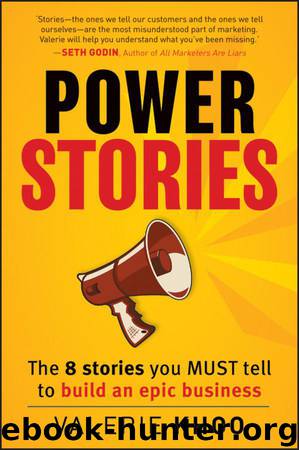Power Stories: The 8 Stories You Must Tell to Build an Epic Business by Valerie Khoo

Author:Valerie Khoo [Khoo, Valerie]
Language: eng
Format: mobi
Publisher: John Wiley and Sons
Published: 2012-07-29T14:00:00+00:00
How does your idea solve a problem?
You need to show that there’s a market for your product and you do this by showing that your idea can solve a widespread problem. After all, you don’t have any sales projections because you haven’t taken the product to market yet. You can’t rely on historical industry data because no-one has done this before. It’s so new that there aren’t even any meaningful industry benchmarks to compare it to.
So what can you do? Well, words alone aren’t going to cut it. Especially not if you’re asking someone to fund your Big Idea. Then again, an endless series of Excel spreadsheets filled with projected cash flow figures won’t necessarily get you over the line either. Anyone can fill up a spreadsheet with numbers, but numbers alone won’t do the convincing. The key is to show that those numbers are achievable. And that boils down to convincing people that there is demand for your product.
This is where you need to take action in order to create the story you need. That’s right. You need to play an active part in moving your story forward so you have a pitch story worth listening to. You need to be the author of your very own choose-your-own-adventure novel, and to make your story compelling enough that the other characters want to come on the journey with you.
The best action step to take is to do whatever you need to show that people — that is, people other than friends and family — will buy your product. Eric Reis, in his book The Lean Startup, refers to creating a ‘minimum viable product’. That’s exactly what Mick did with Coachy.com, a site where you can book one-on-one video coaching with experts ranging from guitar teachers and chefs to surf instructors. It’s an online business co-founded by Pollenizer and entrepreneur Luke Grana.
‘We launched the business within 24 hours of having the idea,’ says Mick. By that, Mick means they created a minimum viable product to see if anyone would use the service. They didn’t build an entire website. They didn’t spend big on advertising. They didn’t invest years in research and development.
‘We faked it,’ says Mick.
They used a single-page website to explain the concept, tweeted about it and within two hours had their first sale. Instead of coaching the customer via a not-yet-built online portal, they simply used Skype video. A series of disparate platforms — for booking, paying, scheduling and video — were used to simulate what Coachy.com would ultimately provide through one interface. These early tests of its minimum viable product enabled the founders to bring depth and anecdotal evidence to their pitch story.
Download
This site does not store any files on its server. We only index and link to content provided by other sites. Please contact the content providers to delete copyright contents if any and email us, we'll remove relevant links or contents immediately.
Pioneering Portfolio Management by David F. Swensen(6280)
Man-made Catastrophes and Risk Information Concealment by Dmitry Chernov & Didier Sornette(6001)
Zero to One by Peter Thiel(5782)
The Motivation Myth by Jeff Haden(5202)
The Miracle Morning by Hal Elrod(4707)
Elon Musk by Ashlee Vance(4118)
Unlabel: Selling You Without Selling Out by Marc Ecko(3649)
The Art of Persistence: Stop Quitting, Ignore Shiny Objects and Climb Your Way to Success by Michal Stawicki(3644)
Delivering Happiness by Tony Hsieh(3415)
Urban Outlaw by Magnus Walker(3388)
Purple Cow by Seth Godin(3194)
The Marketing Plan Handbook: Develop Big-Picture Marketing Plans for Pennies on the Dollar by Robert W. Bly(3041)
Mastering Bitcoin: Programming the Open Blockchain by Andreas M. Antonopoulos(3033)
The Power of Broke by Daymond John(2965)
The Content Trap by Bharat Anand(2913)
Applied Empathy by Michael Ventura(2888)
The Airbnb Story by Leigh Gallagher(2846)
Keep Going by Austin Kleon(2753)
Radical Candor by Kim Scott(2709)
